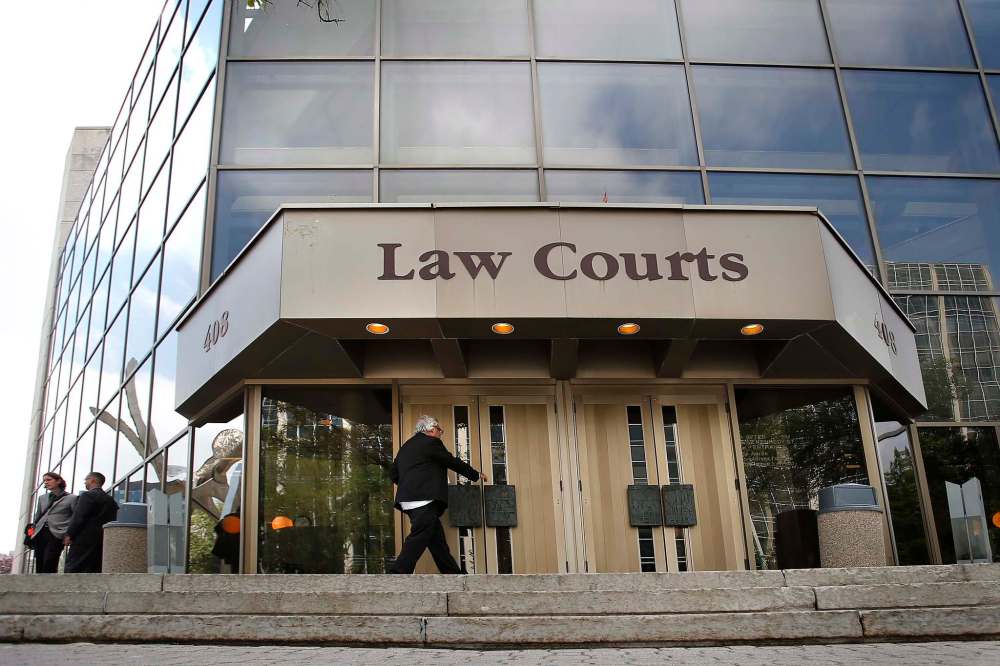Another reminder collective bargaining rights not absolute
Read this article for free:
or
Already have an account? Log in here »
To continue reading, please subscribe:
Monthly Digital Subscription
$0 for the first 4 weeks*
- Enjoy unlimited reading on winnipegfreepress.com
- Read the E-Edition, our digital replica newspaper
- Access News Break, our award-winning app
- Play interactive puzzles
*No charge for 4 weeks then price increases to the regular rate of $19.00 plus GST every four weeks. Offer available to new and qualified returning subscribers only. Cancel any time.
Monthly Digital Subscription
$4.75/week*
- Enjoy unlimited reading on winnipegfreepress.com
- Read the E-Edition, our digital replica newspaper
- Access News Break, our award-winning app
- Play interactive puzzles
*Billed as $19 plus GST every four weeks. Cancel any time.
To continue reading, please subscribe:
Add Free Press access to your Brandon Sun subscription for only an additional
$1 for the first 4 weeks*
*Your next subscription payment will increase by $1.00 and you will be charged $16.99 plus GST for four weeks. After four weeks, your payment will increase to $23.99 plus GST every four weeks.
Read unlimited articles for free today:
or
Already have an account? Log in here »
Hey there, time traveller!
This article was published 14/10/2021 (1522 days ago), so information in it may no longer be current.
The Manitoba Court of Appeal decision upholding the province’s wage freeze legislation for public-sector workers was an important reminder collective bargaining rights are not unlimited.
Manitoba Tories score win in legal battle over wage freeze

Posted:
The Manitoba PC government has won its appeal of a lower court ruling that found its controversial public-sector wage freeze was unconstitutional.
The Supreme Court of Canada has made that clear on more than one occasion.
Chief Justice Richard Chartier, writing for a panel of three justices, ruled (Justice Joan) McKelvey’s findings were “diametrically opposed” to the jurisprudence at the Supreme Court level.
Unions don’t like it. They rail against interference of any kind by government when it comes to collective bargaining — as they did when Manitoba’s Progressive Conservative government introduced Bill 28 (Public Services Sustainability Act) in 2017. Labour leaders called it “unconstitutional” and an “attack on workers.”
However, as the Court of Appeal ruled this week when it overturned a lower court decision on Bill 28, collective bargaining rights under the Charter of Rights and Freedoms are not absolute.
Court of Queen’s Bench Justice Joan McKelvey ruled last year the province’s wage freeze legislation was “draconian” and violated workers’ charter rights. While the decision provided unions and the Opposition NDP with fresh ammunition against Tory rivals, Manitoba’s top court found McKelvey’s ruling was fraught with legal errors and improper conclusions.
Chief Justice Richard Chartier, writing for a panel of three justices, ruled McKelvey’s findings were “diametrically opposed” to the jurisprudence at the Supreme Court level.
“I am of the view that the trial judge erred in her constitutional analysis,” wrote Chartier.
The constitutional debate about how much government can interfere in collective bargaining revolves primarily around two landmark Supreme Court decisions — one of which was a case that ruled on the constitutionality of the federal government’s 2009 wage restraint legislation.
Canada’s top court has established section 2(d) of the charter (freedom of association) provides workers with the right to “associate in a process of collective action,” in order to “engage in a meaningful process of collective bargaining.”
However, the top court has described it as a “limited right” that is restricted in several ways. It guarantees the right to a process, not an outcome, and does not protect all aspects of collective bargaining. There has to be “substantial interference” in the collective bargaining process to breach section 2(d) of the charter.
“The term ‘substantial interference’ was not chosen without purpose,” Chartier wrote. “It was judiciously selected by the Supreme Court of Canada in order to allow legislatures some freedom to move within permissible constitutional limits.”
“The term ‘substantial interference’ was not chosen without purpose. It was judiciously selected by the Supreme Court of Canada in order to allow legislatures some freedom to move within permissible constitutional limits.” – Chief Justice Richard Chartier
McKelvey made several errors in her written decision, released in June 2020, the appeals court said.
Her argument the Supreme Court’s ruling on federal wage restraint didn’t apply to the Manitoba case, in part because the decision dealt with the RCMP (which wasn’t unionized at the time), was an improper conclusion, Chartier wrote.
“All employees, unionized and non-unionized, have identical section 2(d) rights.”
McKelvey wrongly concluded the province should have tried to negotiate contracts prior to introducing its wage freeze bill; and she erred when she ruled removing monetary issues from the process, such as wages, substantially interfered in the collective bargaining process, Manitoba’s top court held.
Canada’s top court has already ruled on that, and it’s binding.
McKelvey also argued because the federal wage restraint legislation contained some increases, it wasn’t applicable to Manitoba’s Bill 28, which included wage freezes for two years. The Court of Appeal ruled that improper, too.
McKelvey’s decision collapsed because she strayed too far into public policy and away from law. It was more judicial activism than sound legal analysis. She suggested, for example, government could have refrained from cutting the provincial sales tax or indexing income tax brackets (instead of freezing wages) if it wanted to balance the books.
That’s not up to judges to decide, Chartier ruled.
McKelvey’s decision collapsed because she strayed too far into public policy and away from law. It was more judicial activism than sound legal analysis.
“Unless constrained by the Constitution, Parliament and the provincial legislatures are supreme,” he wrote.
That’s a good reminder for everyone.
tom.brodbeck@freepress.mb.ca

Tom has been covering Manitoba politics since the early 1990s and joined the Winnipeg Free Press news team in 2019.
Our newsroom depends on a growing audience of readers to power our journalism. If you are not a paid reader, please consider becoming a subscriber.
Our newsroom depends on its audience of readers to power our journalism. Thank you for your support.







